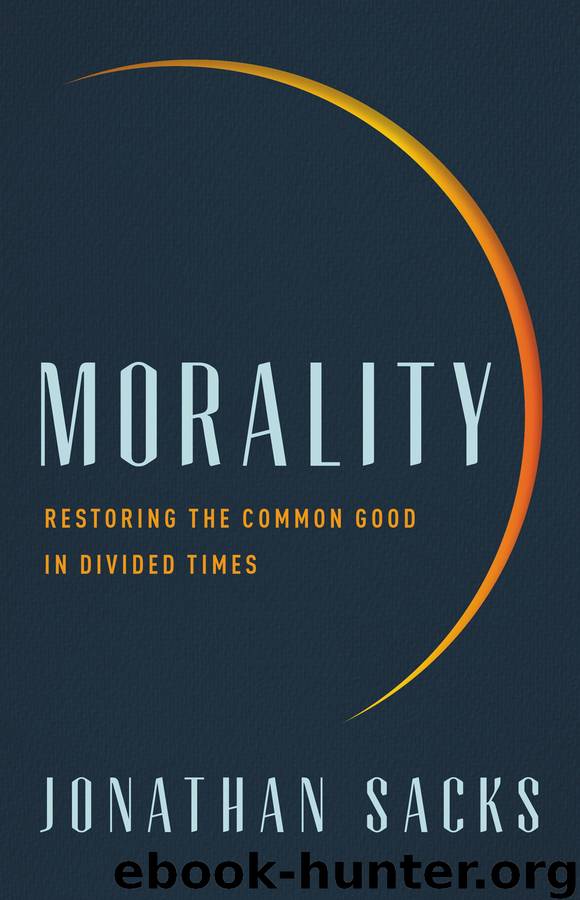Morality by Jonathan Sacks

Author:Jonathan Sacks
Language: eng
Format: epub
Publisher: Basic Books
Published: 2020-08-31T16:00:00+00:00
THERE ARE MANY FACTORS at work in the present assault on academic freedom, but undoubtedly one, as we have seen, is the loss of truth as a value. There is no such thing as truth, goes the postmodern mantra; there are only interpretations. There is no such thing as history; there are only narratives. The university, like every other social institution, is recast. It is no longer seen as a community of scholars in pursuit of truth; instead it is viewed as a system of power. In the past—so the theory goes—the strong exercised hegemony over the weak by teaching them to see the world in ways that perpetuate the existing hierarchy and its injustices. That hegemony must be exposed for what it is. In the new dispensation, there are only victims and oppressors, and if you are not on the side of the victims, you must be an oppressor. That is the moral blackmail currently used to curtail freedom of speech.
One of the scariest books I have ever read is Ed Husain’s The Islamist.21 Husain is a former member of the radical Islamist group Hizb ut-Tahrir. In the book, he gives a graphic description of how a handful of radicals were able to intimidate an entire college in East London, with thousands of students. It should be required reading for all of us. It turns out to be disturbingly easy to blackmail college authorities by threatening to expose them—in this case as racists or Islamophobes—and to ostracize and ultimately oust anyone who resists. The radicals were able to cast themselves as victims. Anyone who opposed them could therefore be portrayed as an oppressor, guilty therefore of our present culture’s unforgiveable sin.
To take a different example: two professors at Yale, Erika and Nicolas Christakis, found themselves at the center of controversy for suggesting that the university should not be directly engaged in regulating what costumes students might wear for Halloween, presumably holding that since Halloween celebrations were not formal university activities but voluntary events organized by the students themselves, it should be for the students to decide. Erika, a lecturer at the Yale Child Study Center, specifically invited the students to deliberate on the matter themselves. “Talk to each other,” she said. “Free speech and the ability to tolerate offense are the hallmarks of a free and open society.” She was encouraging students to take responsibility, but a small group took her remarks the wrong way, reading them as suggesting that she was in favor of racist costumes. Having failed to understand the sensitivities of those who saw themselves as victims, it seemed to follow that she must be an oppressor. She and her husband, Nicolas, were eventually forced to resign as heads of one of Yale’s residential colleges, and Erika Christakis left Yale entirely.22
Nietzsche rightly warned that when truth dies, all that is left is the will to power. The first place where this comes to light is the university, the home if not of truth itself then at least of the pursuit of truth.
Download
This site does not store any files on its server. We only index and link to content provided by other sites. Please contact the content providers to delete copyright contents if any and email us, we'll remove relevant links or contents immediately.
Fearfully and Wonderfully Made by Philip Yancey & Paul Brand(588)
Christian Ethics by Wilkens Steve;(571)
Numbers by Ronald B. Allen(503)
The World from 1450 To 1700 by Wills John E.;(500)
Christian Ethics: An Introduction to Biblical Moral Reasoning by Wayne Grudem(478)
How to Read Slowly by James W. Sire(458)
God and the Multiverse by Victor J. Stenger(448)
Morality by Jonathan Sacks(431)
Monastic Archaeology by Unknown(408)
The Disabled Church by Rebecca F. Spurrier;(396)
Jesus: A New Vision by Whitley Strieber(371)
Critical Writings by Joyce James;(367)
Death of the Doctor by Unknown(366)
Amish Grace by Donald B. Kraybill & Nolt Steven M. & Weaver-Zercher David L(365)
Redeeming Sociology by Vern S. Poythress(364)
The Technological System by Jacques Ellul(352)
Children of Lucifer; The Origins of Modern Religious Satanism by Ruben van Luijk(352)
The Catholic Case for Trump by Austin Ruse(334)
The Church in the Early Middle Ages by G.R. Evans(332)
